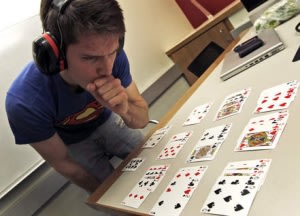The event includes memorizing 99 names, a
shuffled deck of cards, a poem, and a list of 500 words. We'll find our
keys.

Memory competitor Mike Mirski (AP Photo/Alex Brandon)

• Exercise: Seriously. You may think of "mental athletes" as MENSA dorks who eat Cheetos and study flashcards, but the best brains need bodies that work out.
"If you have a healthy body, you'd better have a healthy mind," says Memory Championships founder Tony Dottino. "A third of the oxygen you breathe in is consumed by your brain."
Top competitor Paul Mellor, 53, has run a marathon in all 50 states. He blends mental practice with physical training: While swimming, Mellor keeps lap count by assigning a number to a friend or loved one. So when he finishes a third lap, he thinks of a third cousin. And so on. Defending champion Nelson Dellis, 28, is a mountaineer who has scaled Everest and raises money for Alzheimer's research with every ascent he does around the world.
• Wild Imagery: If there's something you're likely to forget, imagine an action you wouldn't normally do. The best place for your keys is the key holder (imagine that), but if you're in a rush and you have to put your keys down elsewhere, dream up something improbable. Putting your sunglasses down near the blender? Imagine putting them into a smoothie. Drop the mail near the flat-screen? Imagine pasting your TV with envelopes.
Mellor does this when he goes shopping. No need to bring a list when he imagines milk coming out of his nose and having a chicken on his shoulder. Then he goes one step further and assigns frequently purchased foods to body parts, so nose always represents milk and his shoulder reminds him to pick up chicken. He may forget his list, but he won't forget his shoulder.
• Turn Numbers Into Words: Dellis remembers the seven digits of a phone number by splitting it into three groups: the first three numbers, the second two numbers, which he turns into an action, and the last two numbers, which he makes an object.
Take the number 207-4563. Start with 207. Dellis turns all numbers ending in -07 into James Bond characters. So 007 is James Bond, 107 is Austin Powers, and 207 is No. 2. Then 45 is easy -- D is the fourth letter in the alphabet and E is the fifth. So 45 is DE or "Duke Ellington," who plays the trumpet. Now 45 is always a trumpet. And 6 is "S" -- same phonetic sound -- and 3 corresponds to third-letter C, which gets Dellis to SC or "Stephen Colbert," who sits behind a desk. And so he arrives at "No. 2 blowing a desk out of a trumpet" -- 207-4563.
If that seems too complex, divide up digits into jersey numbers. Pedro Martinez wore 45 and Gene Upshaw wore 63. Whatever your system, keep in mind that once you get it down, it'll pay off for the rest of your life.
"I know these sound totally arbitrary," Dellis says, "but when I see numbers I instantly see pictures and make stories out of them." Admit it, you're more likely to remember a James Bond figure blowing a desk out of a trumpet than seven random digits.
• Use Your Voice: How often do we forget someone's name as soon as we hear it? Make an effort to repeat the name immediately. "Nice to meet you, Colleen."
Ask every server at a restaurant his or her name and repeat it when you need something. This will sound cheesy at first -— like you're a used-car salesman —— but it will become second nature and people absolutely love hearing their own names.
And just saying anything out loud is a great tool for memory. Parking in row 2G? Say "2G" when you hit the lock button. (And swap out G for Georgia or a place name, so "I parked in Georgia.") "If I'm driving on the road in the daytime," says Mellor, "I'll say, 'Lights on.' Once I say it out loud, it certainly helps later."